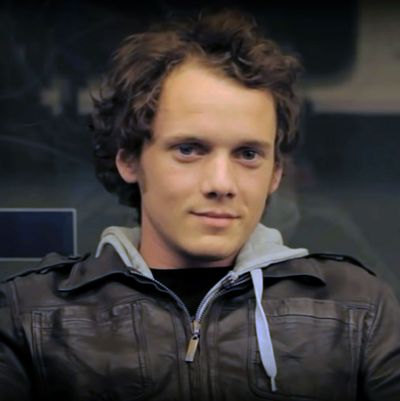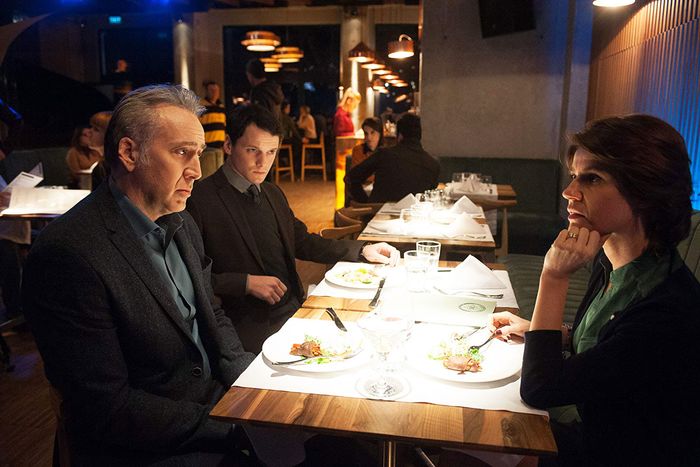
Twenty minutes into the new documentary Love, Antosha, 11-year-old Anton Yelchin has a major milestone on the set of Hearts in Atlantis. “Dear journal, today I had my first kiss,” the preteen actor writes. “It was very nice, and I did it twice. I hope it happens many more times.” In the film these lines, and many more diary entries, emails, and letters, are read aloud by an unseen narrator who sounds nothing like the late actor. While Yelchin, who died three years ago at the age of 27, never quite lost the reediness of his child-actor days, this voice is older, deeper, with more heft to it. Slowly you realize, that’s not just anyone — it’s Nicolas Cage.
Yelchin’s parents, former figure skaters Viktor Yelchin and Irina Korina, were the driving forces behind getting the documentary made, and it was Irina who first suggested Cage for the job. “To Anton’s parents’ credit, they archived everything in his life,” director Garret Price says. “The letters, the diary entries, all his writings were basically a direct tunnel into his brain.”
To narrate Yelchin’s writing, there were three qualities Price needed: (1) It had to be someone who’d had a personal connection with Anton. (2) It had to be someone who wasn’t already being interviewed as a talking head. And (3) it had to be someone with “gravitas,” the better to get across Yelchin’s soulful, searching qualities. “I went to Irina and said, ‘I want to find somebody who can read Anton’s words — not be Anton, just read his words,’” the director recalls. “And she just blurted out, ‘Nic Cage.’”
Considering their shared work ethics, it’s little surprise Cage and Yelchin had crossed paths. The pair co-starred in 2014’s Dying of the Light, a pre–First Reformed Paul Schrader film that stars Cage as a CIA agent suffering from dementia, with Yelchin as his protégé. (Schrader says the notoriously terrible version that made it to VOD was reedited without his consent.) The young man was a fan. “Anton spent six months with Nic making Dying of the Light, and loved him,” Price says. “He respected him as an actor. He was infatuated by all his preparations, everything he brought to the role.” Cage famously rarely turns down a part, and Yelchin hardly ever did, either; because of a childhood diagnosis of cystic fibrosis, he was never sure how much time he had left. Says Price: “In a weird way, if you really look at them, they’re kind of kindred spirits. Anton’s career could have turned out very Cage-like.”
When Price reached out to Cage, the actor said he’d be honored to narrate the doc. Recording took place at the actor’s usual spot for voice-over work, a small studio off the Las Vegas Strip. Cage came in completely prepared, with all of his lines memorized. But in the middle of reading Yelchin’s first journal entry, the one about the kiss, he couldn’t get through it. “He broke down in tears and had to stop,” Price recalls. “He walked out, then came back in and was incredible. It was a really profound, emotional experience for all of us.”
In life, Yelchin’s star image was worlds away from Cage’s, but it’s striking how well their personas merge. “Nic brought the tenacity and voracity that Anton brought to his roles,” Price says. “There’s a line where Anton is writing a journal about being angry about something, and if Anton capitalized something, I’d capitalize it in the script. Giving Nic Cage capitalized words? He’ll go big. It was beautiful.”
Still it was a smaller moment that stuck with Price the most. Yelchin’s parents kept the cystic fibrosis diagnosis from him when he was a child, and he didn’t learn he had the disease until he was 18. As Cage-as-Yelchin puts it in a 2007 diary entry: “My brain is distinctly fucking jumbled, or not so much, actually not really, not at all. The sun is still shining.”
“He’s so optimistic,” Price says. “He’s bummed out, but the sun is still shining. I think that’s the mantra by which he lived his life. That’s the coolest thing about this whole experience: The audience is not only learning about Anton and all his work, but it’s a very self-reflective film. People start questioning how they’re spending their time here on earth. Living life to the fullest, he was the definition of that.”



